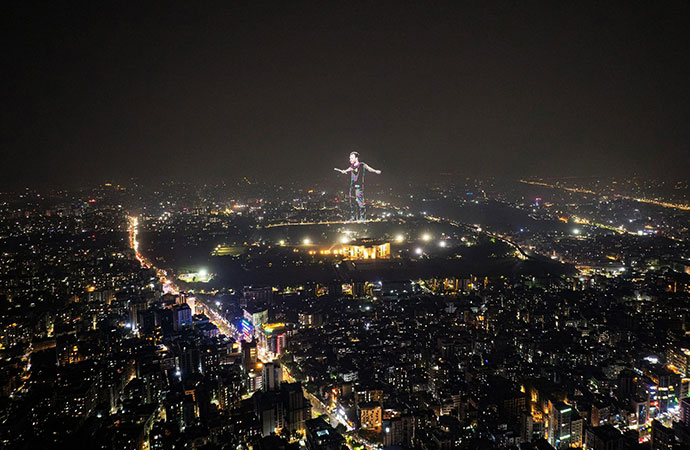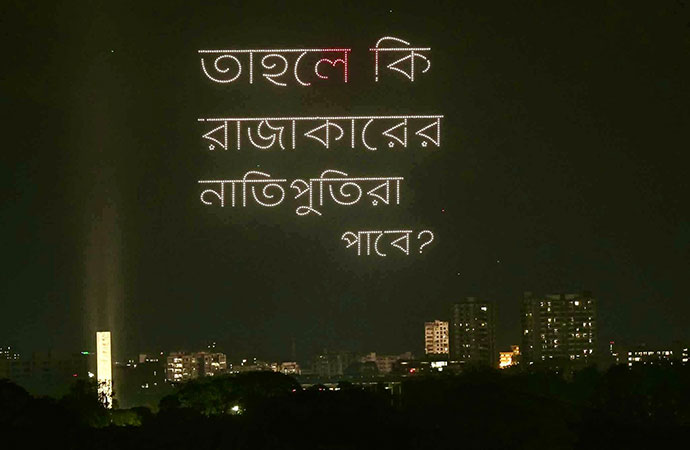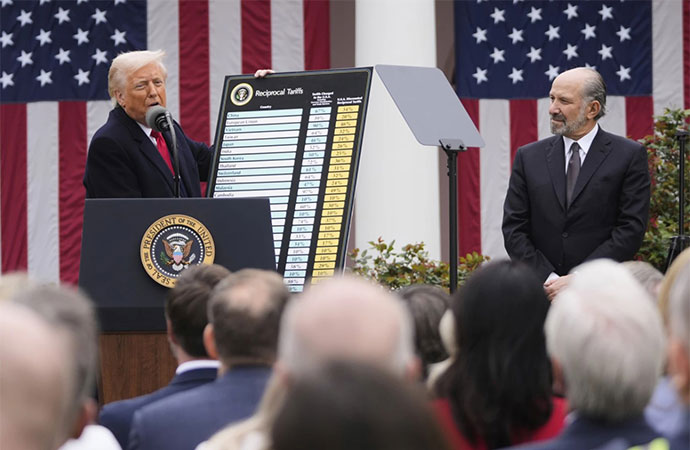Reportage

Photo: Abhijit Nandy
The week starting Sunday, July 14 was arguably the most consequential of the July Uprising of 2024. Under the then-little known banner of Students Against Discrimination, the likes of Hasnat, Sarjis, Asif and Nahid had started observing a series of programmes from July 1 itself, against a move to revive the quota provision in government jobs, whereby some 56% of these posts were being reserved under various quotas, squeezing out merit-based applicants who were often left wallowing in frustration - armed with degrees but left unemployed or at best, underemployed.
Students of public universities and colleges along with jobseekers had been staging demonstrations against the quota system in government jobs since July 1. They occupied key city intersections, major highways, and rail lines during their demonstrations, but faced no major obstruction from the state's law enforcement agencies during the first 10 days.
Starting from the 7th of July, this new name started appearing for the programme planned to pursue: 'Bangla Blockade.' Queries revealed it would mostly consist of a standard oborodh programme's activities, but something about the name and the energy it conveyed sounded more like a rock concert. If some of us were intrigued however, that was about the extent of our interest at that point.
"We knew the Bangla word 'oborodh' would not work - it was too conventional. The word 'blockade' in English carried the gravity and it also resonated with the energy the youth brought to the movement. So we went with that. And since we intended to block the entire country, the word 'Bangladesh' was a natural choice. However, 'Bangladesh Blockade' sounded too long, so we shortened it to Bangla Blockade," Sarjis Alam, a key coordinator of the movement, now chief organiser in the country's north for the National Citizen Party, later explained in a tv interview.
Nevertheless, it wasn't until July 11, a Thursday, that their programme grew into something truly disruptive - something you could no longer ignore. It was the day after the then-prime minister, Sheikh Hasina, had returned home a day early by most accounts, from what could have been an important state visit to China. As if to pour salt on her wounds, the Students observed the 'Bangla Blockade' programme on July 11 breaking down the police barricades in several locations. At least 50 protesters were injured across the country with police resorting to baton charges and firing tear-shells to disperse the demonstrators in different parts of the country, including capital Dhaka, Cumilla and Chattogram.
"The Bangla Blockade was one of the most important programmes of the July Uprising. Essentially, this blockade served as a preparatory phase for the mass uprising. We introduced this new kind of programme to involve the masses. The courage and enthusiasm that people showed during the blockade later inspired them to march towards the Ganabhaban," another key coordinator, Nahid Islam, now the NCP's convener, has said.
Which is perhaps why Asif Mahmud Shojib Bhuiyan, the high-flying adviser and leader without post in the NCP, July 11 stands out as the anniversary of the movement. Yet to others, that date differs, speaking to the earthshaking events that would keep revealing themselves in the days ahead, one after another. Others will point to the unprecedented events of the night of July 14, when residential students of the 5 women's halls of Dhaka University took the lead amid the groundswell of anger that followed Sheikh Hasina's last press conference, the night of that infamous slur.
July 16th: Wrought in Blood
The 16th of July, 2024 was marked by fierce clashes between activists of Bangladesh Chhatra League (now banned student wing of Awami League), police and anti-discrimination student movement protesters across the country, leaving at least six people, including Abu Sayeed, dead while government deployed Border Guard Bangladesh (BGB) in six districts to resist the movement.
The government declared closure of all universities, colleges and secondary schools across the country and suspended HSC and equivalent examinations of July 18, asking the university students to vacate halls.
As the quota reform protesters were staging demonstrations nationwide on July 16 protesting Bangladesh Chhatra League (BCL) activists' attacks on Dhaka University and Jahangirnagar University students on July 15 and early on July 16, BCL men again attacked the protesters across the country while police opened fire at BRUR killing its student Abu Sayeed - one of the lead organisers of the SAD movement in Rangpur.
On the day students from private universities and colleges also joined the protest across the country. According to Amnesty International, by the afternoon of July 16, police fired tear gas and charged with batons drawn at protesters in front of Begum Rokeya University, Rangpur (BRUR) where students had gathered, led by Abu Sayeed, a protest coordinator.
Abu Sayeed, a student of the English department at the BRUR, stood his ground. As the police closed in, he spread his arms wide open, in a moment of defiance when at least two police officers discharged 12-gauge shotguns directly towards him from across the street - a distance of merely 15 meters. The video of Sayeed's brutal killing sparked outrage across the country and encouraged people from all walks of life to take to the streets, turning the 'quota reform movement' into a massive uprising against the Awami League government.
Besides, five more people, including two students, were killed in Dhaka and Chattogram and several hundred sustained injuries on the same day as the police and BCL activists jointly launched a heavy crackdown on the anti-discrimination student movement protesters across the country.
Two youths were killed during clashes in Dhaka College and Science Lab areas between the BCL men and protesters. They were identified as Md Shajahan, 24, a hawker who had a makeshift shop in front of Balaka Cinema Hall, and Sabuj Ali, 25, son of Badsha Ali and Surja Banu, of Nilphamari Sadar.
The SAD protesters in the capital blocked key intersections in the capital, including Jatrabari, Science Lab, Pragati Sarani, Shantinagar, Badda, Motijheel Shapla Chattar, Tantibazar, Uttara, and Beribandh, bringing traffic to a halt. They also blocked rail lines in Mohakhali for more than six hours, suspending communications between Dhaka and most parts of the country. The demonstrators also obstructed Dhaka-Chattogram, Dhaka-Sylhet, Dhaka-Tangail, Dhaka-Mymensingh, and Chattogram-Cox's Bazar highways.
Though Chhatra League and quota protesters held separate rallies at separate places on DU campus without any major incident, the Dhaka College and Science Lab areas turned into a battlefield as the quota protesters put up stiff resistance against Chhatra League activists' attack on them.
Violence in the city's Chankharpul, Rayshahebbazar of Old Dhaka, Bhatara on Pragati Sarani, Mirpur-10, and Farmgate areas were also reported. A clash also broke out between students of some private universities, including Dhaka International University, United International University and American International University, Bangladesh, and activists of Chhatra League in the Bhatara area in the city.
Besides, three people, including two students, were killed in clashes between the protesters and BCL men in Chattogram. The deceased were identified as Wasim Akram, 24, a student of Chittagong College and a Jatiyatabadi Chhatra Dal (JCD) leader, Faisal Ahmed, 24, student of management at the Omargani MES College, and Md Faruk, 32, an employee of a furniture shop.
Hasnat Abdullah, one of the key coordinators of the anti-discrimination student movement, termed the violence that took place across the country that day as "state-sponsored attacks" on the protesters.
Asif announced a coffin procession and a gayebana janaza (funeral without the body) at Raju Memorial Sculpture at Dhaka University campus at 2pm the next day. As the situation deteriorated significantly across the country following the six deaths on the day, the government deployed BGB in Dhaka, Chattogram, Bogura, Rangpur, Rajshahi and Gazipur.
Besides, it closed secondary schools and colleges for a sine die and suspended the HSC and equivalent exams scheduled for July 18.
On the night of July 16, the University Grants Commission, referring to an Education Ministry decision, declared all public and private universities and their affiliated colleges closed until further notice and asked the students to vacate their halls. Besides, the leaders and activists of the then ruling Awami League and its associate bodies were instructed to take positions at their respective unit offices across the country from early July, saying that the party wanted to face the student movement politically.
Gopalganj: Did the bastion hold?
Clashes erupted on Wednesday after leaders and supporters of the Awami League and the now-banned Chhatra League allegedly attacked the National Citizen Party's (NCP) rally in the district.
Confrontations followed between the attackers and law enforcement, during which four people were reportedly shot dead. The deceased were Ramzan Kazi, Sohel Rana, Dipto Saha and Imon Talukder.
Families of the victims claimed they had all been shot and killed by law enforcement personnel.
None of the four victims underwent an inquest or autopsy procedures.
Imon was buried at around 7am on Thursday at the municipal graveyard in Getpara, and Sohel was laid to rest at his family graveyard in Tungipara at about the same time. Ramzan was buried on Wednesday night after the Esha prayers in Getpara, while Dipto's cremation also took place at the municipal cremation ground the same night.
Dr Jibitesh Biswas, superintendent of Gopalganj General Hospital, told a Bangla daily that all four bodies had been brought to the hospital, but no post-mortems had been conducted.
He added that many others had been treated for injuries.
Police also reportedly did not perform any inquest reports. Meanwhile, family members claimed no death certificates had been issued by the hospital.
Dhaka Range Deputy Inspector General of Police Rezaul Karim Mallick acknowledged that the autopsies had not been conducted.
He told reporters that more than 25 people had been detained so far.
When asked why no post-mortem examinations had been carried out, he did not provide a direct answer but said the authorities would bring the matter under legal procedures, adding that preparations were underway to file a case over the incident.
According to a police report shared with the media by the Chief Adviser's Press Wing, "an unruly mob forcibly took the bodies of the four deceased from the district hospital, preventing autopsies from being performed."
However, family members gave a different version.
Ramzan's uncle, Kalim Munshi, told the daily Prothom Alo: "I saw in a video that my nephew was shot. We took him to the hospital, but could not save him. When we tried to take the body to the police station, we found the gate locked.
"Later, we brought the body back to the hospital for a post-mortem, but the hospital staff said, 'Take him home now; there might be trouble here.' So we could not do the post-mortem."
Sohel's uncle, Zahidul Islam Talukder, said: "I found out over the phone yesterday (Wednesday) afternoon that my nephew had been shot dead. By the time I arrived, the body had already been brought home from the hospital. No autopsy was done, and we did not receive any death certificate from the hospital."

























Leave a Comment
Recent Posts
Right On Schedule
The most eagerly anticipated, and frankly hyped up, announcement of an ...
Fighting raged along the borde ...
Fighting raged along the border of Cambodia and Thailand, with explosi ...
ICIMOD drives regional cooperation to inspire new mo ..
The Cage of Captivity and the Cry for Freedom: A Cru ..
Why Japan issued an advisory for a possible megaquak ..
The Autocrats’ War on Universities